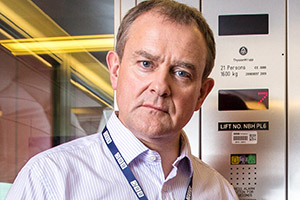Hugh Bonneville interview
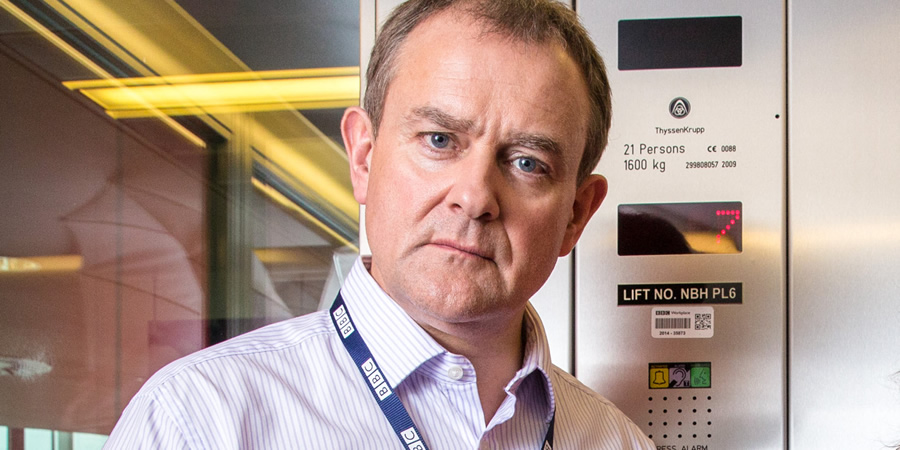
Hugh Bonneville is back spouting jargon as the BBC's fictional Head Of Values, Ian Fletcher. We got the chance to chat with him whilst he was filming on location at the BBC's New Broadcasting House headquarters in central London.
What can you tell us about your character and this series of W1A?
Ian Fletcher's bedside reading is currently 'The Sinking of the Titanic and Other Psychological Conditions' and 'Optimism in a Post-Truth World'. So he is very much keeping a positive outlook while at the same time testing the emotional lifeboats.
It's now more than six years since the debut of Twenty Twelve. Did you think you'd still be here five years after the Olympics?
No, absolutely not. I had no idea that he was going to do such a fantastic job of saving the Olympics from the face of disaster and coming on to re-evaluate and indeed recondition the BBC! So it's quite an exciting ride. But I think really it's time for him to hang up his hi-vis jacket now because I can't remember the lines anymore.
How much is Brexit going to interfere with his work?
Actually even though [writer] John Morton is usually quite prescient in his storylines, which obviously he's written a year in advance, he's stayed clear of anything I think particularly current or that we knew was coming over the horizon. Nevertheless there are always things that pop up, that surprise constantly on a daily basis. Elements of story that you suddenly see in real life, but Brexit is something he's, I think, quite wisely avoided.
If you're avoiding Brexit, are you avoiding fake news?
One of the things I've just been doing actually, I can't even remember the lines now... but it was about how Ian is trying to spin something that gets leaked out, and he talks about how sometimes social media runs riot before all the facts are fully out there, so this is a good chance to correct a lot of misunderstandings that are out there. He doesn't quite use the term "fake news" but it's pretty close. But, I know, media is eating itself. So never has W1A been more pertinent!
What's your favourite storyline of the series?
The escalating crisis within the mind of Anna Rampton is a great thread to follow. We know her as an ice maiden but somewhere inside there is a 14 year-old panicking to get out. The lengths she goes to put herself in Ian's path, particularly when he has his cycling outfit on, is very funny. And I love the fact that in the denouement she tries to present Ian's destiny as a fait accompli.
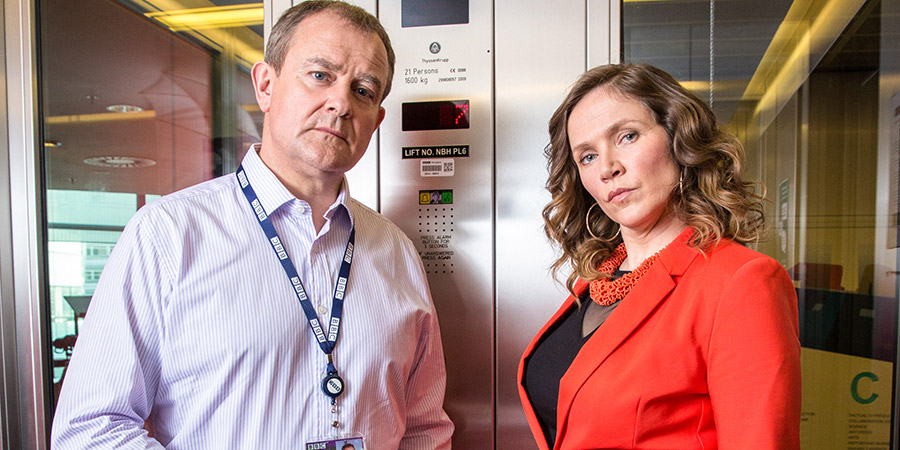
How's Ian dealing with Siobhan Sharpe this year?
As happens with so many of these media organisations, they get bought out by even bigger companies so Perfect Curve has now been bought out by foreign media; a largely Dutch organisation that has some great new ideas going forward.
Is there anyone you particularly enjoy playing opposite or watching them work?
Hugh Skinner's character has a vocabulary of about four words to play with but he uses them with such precision; he's immensely skilful and makes it look effortless.
When watching Jessica Hynes you think at first she's sculpting jelly then suddenly it sets and it's sublime.
Who do I like acting opposite? "They're all marvellous, darling."
There's been a bit of a gap between the series. Did you think that was it after the last one? Did this series come as a bit of a surprise for you?
No! In fact we'd all cleared our diaries to shoot it this time last year and I was then told that apparently my availability was the reason they hadn't been recommissioned. As only the BBC could! It had nothing to do that they were nervous about charter renewal and Licence Fee negotiations, so that's all good.
Is it one of the most difficult things you have to do, because the lines are just so convoluted? All the "umm"s and "ahh"s in there - it must be a nightmare to learn?
It is. Whilst it's not actually rocket science or indeed saving lives it is the hardest thing I've ever done. And that's another reason for it to come to an end I think. I'm just getting too old and I want to make easy money. So yeah, because, as you say, it's so precise and John's head is not linear: John's head is completely all over the place.
Yeah, John's brain is huge. I mean for a hermit it's amazing how much he picks up on the bollocks of human narrative of narration and the way that we don't communicate at all when speaking, but he does have a great ear for nonsensical dialogue and somehow that we you know we talk guff, particularly on camera in the fake media and think we're making sense when we're not. But it's very hard to learn, very hard to do it intentionally.
You say you're happy to give it up...
No, now you're putting fake news into my mouth! I didn't say I'm happy to give it up, I said it's about the right time to. It has been a great thing.
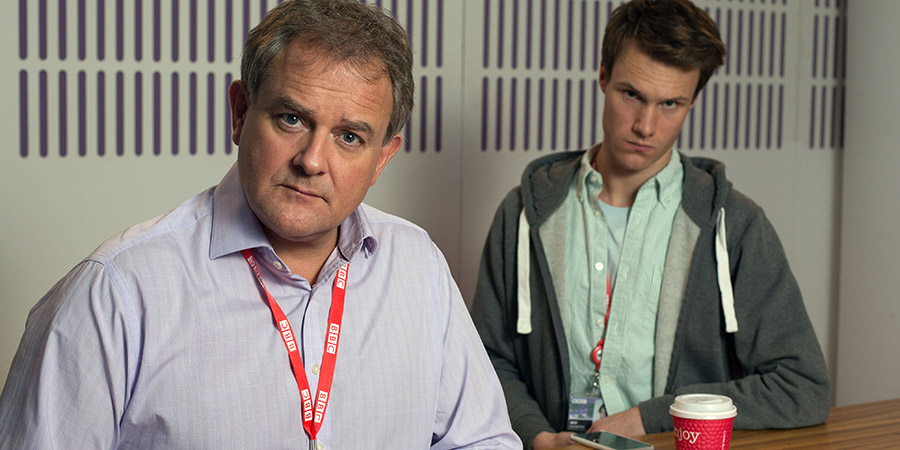
Did you ever harbour ambitions for him stepping on the international stage?
I did think about stepping into the boiling cauldron of American politics but now that's become so absurd that I think you really couldn't. I think Veep's having a hard time keeping up with it, let alone House Of Cards. John did talk to me a couple of years ago about what about Ian Fletcher going to help out with Boston's bid for the Olympics, but then Boston had its own sort of internal complaints that they didn't want to have a bid for the Olympics - I think the mayor, or someone. So there was a campaign to not spend all that money, so Ian didn't go to America and I think that's probably wise!
Is he a particularly British figure, do you think?
Oh I think because he is the sane one at the centre of lunacy, I think he works anywhere. I think we all identify with Ian as the person who at any given meeting of whatever scale is the person who is sensible and knows that the only way to do things is to do them yourself. But you have to cope with the nutters around you, so I think he's recognisable all over the world, frankly.
He does grow so exasperated. Do you ever think 'why doesn't he leave this job'?
He does. I think maybe there's a tenacity and a loyalty about seeing the job through in the face of adversity. But I do think he does at times remind me of that guy in the in the second Gulf War who denied the tanks were rolling into town, and there they were in shot. This eternal optimism. It's like Paddington Bear, reset to positive. Whether that's a British trait I don't know, but he certainly doesn't throw in the towel and I admire him for that.
What are some of the issues that he's having to deal with this series?
Well I think Ryan Chelford is an interesting case in point. Ryan was a fantastic - well, certainly a premier footballer - and he's very keen to be a pundit now on Match Of The Day. He's a sort of Eddie Izzard of football insofar as he enjoys cross-dressing and so forth. And so when when the team of Match Of The Day eventually decide that actually he is not right for presenting, he assumes - or the BBC gurus assume - that it's related to that, and they wouldn't want to give offence to that section of the minority community. In fact it's because he's a really rubbish presenter, and most people wouldn't care what he looked like - he's just so incredibly boring. So we bend over backwards for an entire episode trying to justify the reason that he's not actually going to be on Match of the Day so as not to cause offence.
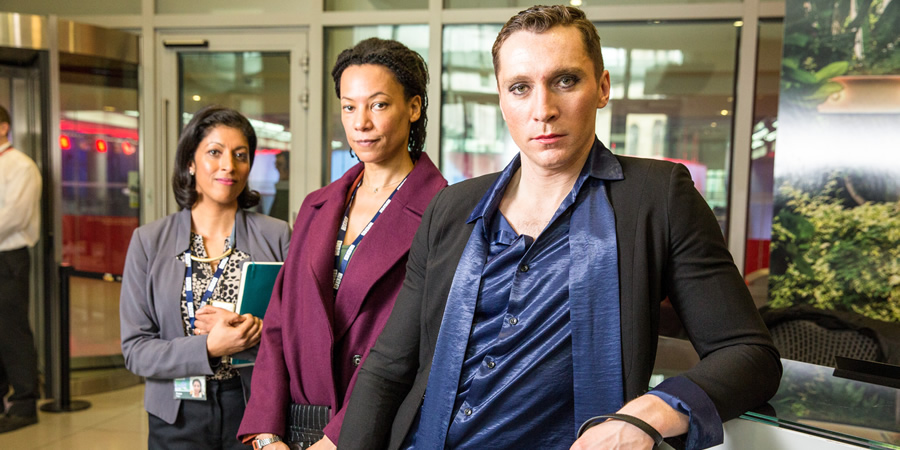
Other things coming over the horizon are of course charter renewal and we get quite involved with the D.C.M.S. - "the Department of Culture, Media and also for some reason Sport", as we call it - and so we we meet this very earnest but sincere and scary woman who's the minister, Fiona, and her colleagues Chloe and Zoe - in the same way that Simon Harwood has Ben and Jerry. These mandarins you never quite know what they're there for but they clearly do something very important. But it's also I think reflecting real life. It's a period in which the BBC is readdressing itself. We have the "more of less" initiative to try and re-evaluate certain positions within the BBC so all various people, even at my senior level of management, find ourselves re-interviewing for jobs that have actually got smaller, i.e. cuts are on the way, and that's a bit like being in the BBC itself.
Does it make you feel protective towards the BBC as well as gently mocking it?
It does hugely, because it's not a satire like The Thick Of It - it it's satirising anything it's satirising management per se, and that's why I think people who aren't involved in media can still recognise it. Even though it does seem to chime particularly well with people who work in this building. You know, I grew up with Auntie and I'm enormously fond of her and I just wish she wouldn't miss slap herself around the face so much sometimes. These are tough, challenging times, I mean I sound like I'm interviewing for Director-General, but these are challenging times but I think a slimmer, more nimble BBC is what we're going to end up with - as long as it's got some muscles left. I hope.
There was an almost disturbing love story blossoming last series between Ian and Anna Rampton...
It's fair to say that there's a sort of unspoken love triangle going on; well not even a love triangle but a sort of slightly curious muddle between myself and Nina's character, Lucy, and Anna. It mainly manifests itself by Anna buying a bike and deciding that she's going to join the ranks of the fold-away bike team in order to try to get closer to Ian. If indeed she stays the course, and stays with the BBC for the the run of the series... We have to wait and see!
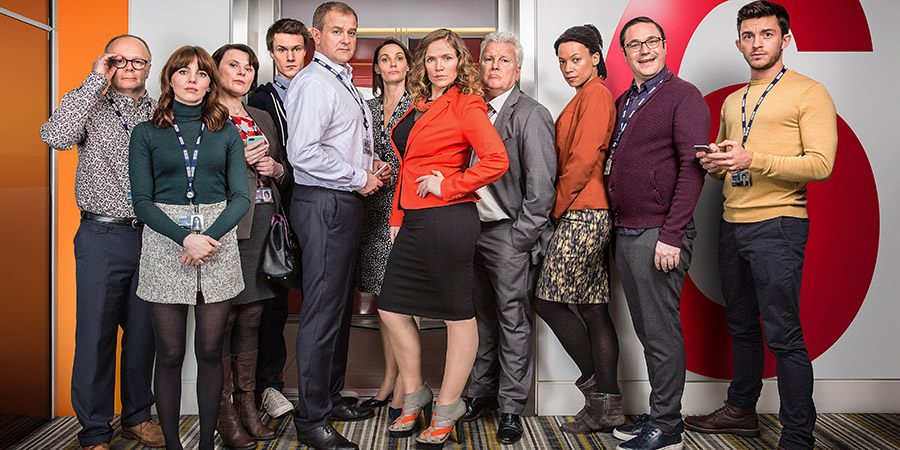
Is there much rivalry with Simon? In the past we've seen one getting a new bike and the other going one better. Is there much of that going on?
There's a bit of that. We were filming a sequence the other day where, as John Morton describes it, it's a bit like planes coming into land at Heathrow, with three cyclists streaming in formation into the front of the BBC. Simon has I think still got the best Brompton available, I've got the next one down, and Hugh Skinner's character, Will the intern, has got my hand-me-down. Then Anna has shot right over the top and going for the super luxury executive version of the bike. Not that she knows how to fold it.
How much do you think this show, and the best British comedy, is about social class?
Gosh. That really hadn't occurred to me. I think what John Morton has done, and I was thinking about this the other day, reflecting on all the characters involved in Twenty Twelve, not just this, is that they are all absolutely recognisable characters but they're all quite different.
I believe all of them; I believe I've met all of them. And I think that's why it's resonated, but I hadn't really thought about it in terms of social structure, just in terms of people we know and resonate with. The person in the meeting who is always trying to pass the buck; the person who says they know something before they've even actually read up on it and whatever. I think we've all come across these people. In terms of social class or anything, it hadn't really occurred to me.
We just wondered if Ian represents a last bastion of kind-of upper-class decency that we've lost?
I don't know. I genuinely think John has tried to create a character who is trying to do good in a mad world and is not unintelligent, but I don't think John would ever make any claims to be making a social comment beyond that.
Is there much corpsing on set?
Oh, it's ridiculous. There is. When you've got Jess Hynes on full tilt. No, yeah, it's very funny but actually it's laughs that come out of sheer terror because we have a huge page count to achieve every day and never enough time to do it.
You're big on social media. What would you think of the concept of 'BBC Me'?
Well it's all coming true! Again, the other day we were doing something and some senior managers said "but we're already thinking about it". Not BBC Me, but something very similar.
The concept of BBC Me is that because the BBC has run out of ideas it gets the audience to provide the content and I did get a letter the other day from someone who shall remain nameless but basically some poor intern had clearly been shouted at by her boss saying "get me some talent and get me some ideas now" and so I got this letter saying "anything you want to do at the BBC, please just let us know".
Literally anything. This was for a Christmas programme. So we sat around and we chewed the fat and came up with some ideas like I Did It Norway and the history of the Christmas tree that's delivered to Trafalgar Square - not a bad idea actually - and things like that. Hugh Bonneville's Favourite Revolving Restaurants Of The World, and Five Star Hotels, and then strangely a week later I got a got a request from ITV... would I like to do a programme about the hotels of the world - the only drawback being one night I could sleep in them and the next day I'd have to clean the toilets, so it would be an upstairs downstairs concept. I'll just stick to acting I think.
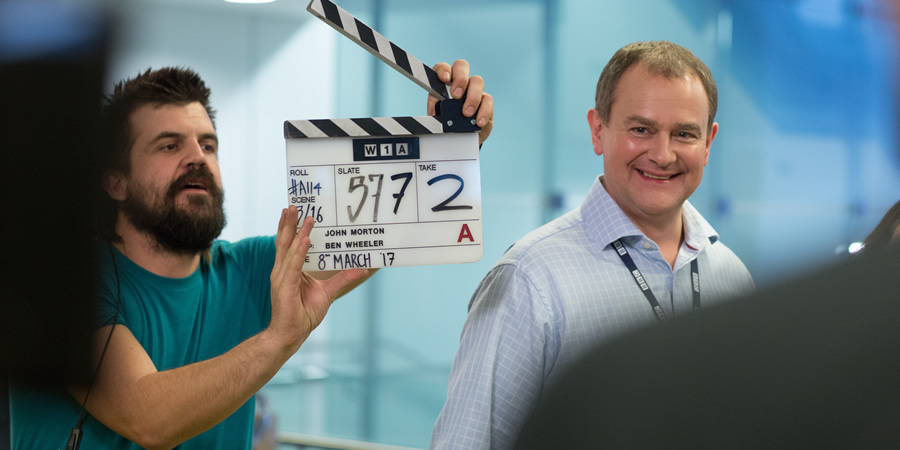
Do you see a lot more to cover, in mocking this world of middle management?
There certainly are lots of backdrops against which John's characters could reverberate, but without wishing to compare myself to Steve Redgrave, I think if I do accept another series, shoot me, because we've only been doing it six weeks but I feel like I've aged about thirty years! Each time I swear I'll never do it again and then I watch it and I think actually it's really quite good and John's such a great guy and we all somehow reassemble a few months or years later. But I think probably Ian's had the best of his run..
You've just been doing a scene with Sophie Raworth. Are there many more celebrity cameos this series?
Who have we had in? Brian Cox has been in. We've had Claudia Winkleman, who I have to say was a complete delight - mainly because she claims it is her favourite show. Inbetween takes, whereas most people sit down and have a coffee she kept saying "I can't believe I'm in my favourite show!" She was a hoot and didn't try to 'act', so was was really good.
There's quite a complicated storyline about lovely Claudia as you can imagine. David Wilkes who is our Head of Daytime Factuality or something or other gets himself in a pickle trying to commission a programme for her and we have to try and unravel it. She was a good laugh. Jeremy Paxman pops in, yeah - so all sorts of people.
Do you enjoy getting out of the studio and actually filming on location?
Well we were at Pinewood Studios for the first three or four weeks and so you sort of feel "we're going on a school trip coming to the BBC", but actually I think the jokes are for everyone who works here. I think the first two series they were very indulgent and very accommodating and now they're just cross. Having said that, there are only about a third of the staff that used to be here so we got a lot more space to work in.
Have you met anyone here who reminds you of Ian?
Oh I think every day you see Simon Harwoods wandering around in their brothel creepers, you see Ian Fletchers everywhere... All these types who work in offices and buildings and great institutions. They're all here. And I think every one of them thinks that this character's based on them!
Is W1A essentially a kind portrayal?
I think so. And I think, as John wasn't trying to stitch up the Olympic Committee, he's certainly not trying to stitch up the BBC. He has an enormous affection for it, but a bit like your favourite auntie who drinks too much, you wish she wouldn't. Ultimately, there's a cri de coeur in the final episode from Ian Fletcher, in a very John Morton underplayed way, about the value of the BBC and the importance of it, and do we want to end up with just Fox News.
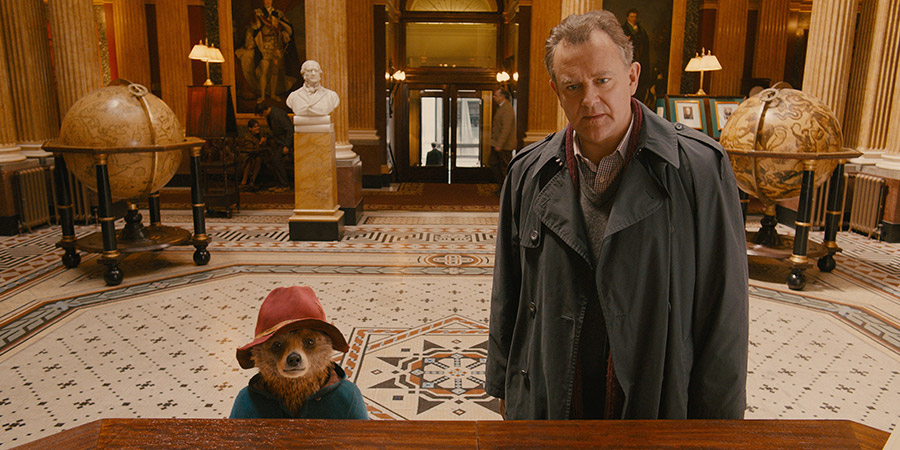
When you star in a spoof mockumentary like this, is there any confusion from the audience when you're out and about as yourself, do they think it's Ian from the BBC?
Yes you get a bit of that. It's a bit of "so is this person going to be 'how's your labrador' or 'it's all good'?". I'm always quite surprised, especially when they come out and say [in reference to Paddington, pictured] "oh it's Mr. Brown, have you got any marmalade sandwiches?"
It can be quite surprising. People you expect are going to be Downton nuts are actually much more passionate about this because they say "oh gosh you should be in my office because I work in pharmaceuticals and it's exactly the same as the BBC". So I think that's why it struck a chord, both with Twenty Twelve and W1A, because it just resonates around groups of people getting together.
In the immediate aftermath of filming something like this, do you feel like some of Ian's lingo seeps into your own everyday speech?
Yes it does. In fact we had an email exchange, about six of us in the cast the other day, about something completely unconnected with our characters and just found ourselves going "Yes, exactly, yes" or "yeah, bollocks", or me saying "that's all good". We just found ourselves responding sort of in character. The catchphrases are very addictive and you do find yourself using them in real life, at least for a few weeks.
Richard Curtis did that Love Actually sequel for Comic Relief; what if you did a Notting Hill one?
God! That would be a laugh actually, yeah. I've just been working with Hugh on Paddington 2 - Hugh Grant plays the baddie - and he hasn't aged a bit. He's probably got botox or something, but we were reflecting on the fact it is 20 years since we did that film, which makes me feel very old suddenly.
What we did for Comic Relief as W1A was some trails and idents, some with Lenny Henry involved, and Perfect Curve making a complete mess of things as usual.
Why is W1A so popular?
Some people misconstrue it as a satire about the BBC. It's not, any more than Twenty Twelve was a satire about the Olympics themselves. It's actually just a framework for seeing characters who are on the whole incapable of achieving what's in their job description. Some of the characters are idiots, some are endlessly doing battle with idiots - and I think we can all identify with those situations, whether we're on the fundraising committee for the village cricket pavilion, or in President Trump's cabinet.

